英语语法一般将来时的含义、结构、用法
一般将来时的含义,结构,用法,标志词

一般将来时的含义,结构,用法,标志词一般将来时的含义,结构,用法,标志词一般将来时是英语中表示将来时态的一种形式,用于表达将来会发生的动作或状态。
一般将来时的结构为“will / shall + 动词原形”,或是“be going to + 动词原形”。
在句子中,我们可以根据需要使用助动词“will”或“shall”,但在口语中,“will”更为常用。
而“be going to”则用于表达我们已经有计划或打算去做某事。
在文章中,我将探讨一般将来时的含义、使用方法以及标志词,并结合实例进行详细说明。
一般将来时的主要用途是表达将来的动作或状态。
当我们想要表达对未来的预测、打算、意图、决定或承诺时,可以使用一般将来时。
我们可以说:“I will go to the supermarket tomorrow.”(我明天会去超市。
)这里表示了对未来行动的打算。
而当我们使用“be going to”时,通常是指现在已经有计划或打算去做某事。
例如:“I am going to visit my grandparents next week.”(我下周打算去看望我的祖父母。
)这里表达了我已经计划好的未来行动。
在句子中,我们可以根据需要使用助动词“will”或“shall”。
“I will help you with your homework.”(我会帮你做作业。
)在口语中,“will”更为常用,而“shall”通常只用于第一人称(I 和we)的疑问句和请求句中。
例如:“Shall we go to the cinema tonight?”(我们今晚去看电影好吗?)另外,标志词也是使用一般将来时的重要标志。
“tomorrow”(明天)、“next week”(下周)、“soon”(很快)、“in the future”(在未来)等词汇在句子中表示了动作或状态将要发生的时间。
一般将来时是英语中用于表示将来时态的一种形式,可以通过“will / shall + 动词原形”或是“be going to + 动词原形”进行构成。
六、一般将来时

初中基础语法——时态三、一般将来时概念:一般将来时表示将来某一时刻的动作或状态,或将来某一段时间内经常的动作或状态。
常常和表示将来的时间状语连用。
如:tomorrow(明天),next week(下周),from now on(从现在开始);in the future(将来)等。
一般将来时由助动词shall(第一人称),will(第二、三人称)动词原形构成。
基本构成:be going to表示主观的打算或计划。
shall和will 常常缩写成'll ,紧接在主语之后。
其否定式shall not 和will not 的缩写式分别为shan't 和won't。
be to表示客观安排或受人指示而作某事。
后+动词原形。
be about to+动词原形,意为马上作某事,不能与tomorrow,next week等表示明确将来时的时间状语连用。
句型:肯定句、否定句、疑问句被动句:will/shall+be+v.ed(及物动词过去分词)The letter will be sent tomorrow.这封信明天将寄出去We shall be punished if we break the rule.如果我们违反规定,我们将受到惩罚。
注意:will和shall在句子中所表达的“意志”是不同的,当句子主语是第一人称(I)的时候表示的是主语I 的自主“意志”,很多人可能会问什么是自主意志。
例:I will be clear tomorrow . 我会把这件事弄个水落石出(词句有多个意思,这里举此例)分析:这个句子中用will时,主语I(我)就带有强烈的意志,意思是我想让事情水落石出,并且有我会为此付诸努力的意思。
当第一人称,用shall的时候就是一个普通的句子,就没有主语的意志。
I shall come back in ten minutes .这句话就是单纯的说我会在10分钟后回来没有别的意思I will come back in ten minutes. 而这句话就有一种意境上的不同。
一般将来时的含义,结构,用法,标志词

文章标题:深入探究一般将来时:含义、结构、用法和标志词随着语言的发展和变化,不同的时态在语法中扮演着重要的角色。
一般将来时作为英语语法中的一个重要时态,其含义、结构、用法以及标志词都是我们需要深入了解和探讨的。
在本文中,我们将从简单到复杂,由浅入深地探讨一般将来时,以便读者能够更加全面、深入地理解这一语法时态。
1. 含义一般将来时表示将要发生的动作或状态,是英语中用来表达将来时态的一种常用形式。
当我们想要表达未来某个时间点发生的动作或状态时,就可以使用一般将来时来表达。
2. 结构一般将来时的结构非常简单,通常由助动词“will”(或“shall”在一些情况下)+动词原形构成。
例如:- I will go to the store tomorrow.(我明天会去商店。
)- She shall be here soon.(她很快就会到这里。
)3. 用法一般将来时的用法包括表示未来的计划、安排、预测、意图、承诺等。
我们可以根据不同的语境来灵活运用一般将来时,以表达我们的意思。
4. 标志词在使用一般将来时时,通常会伴随一些标志词,如“tomorrow”(明天)、“next week”(下周)、“in the future”(将来)、“soon”(很快)等。
这些标志词可以帮助我们更准确地表达时间和动作的关系。
通过以上简单的介绍,我们可以初步了解一般将来时的含义、结构、用法和标志词。
然而,要真正掌握这一时态,我们还需要更深入地探讨。
在实际使用中,我们常常会遇到一般将来时和其他时态的区别以及一些特殊情况的用法。
在条件句中的一般将来时的用法、与现在进行时的区别、含有时间状语的一般将来时等。
对于这些情况,我们需要更进一步的学习和实践,以便更加灵活地运用一般将来时。
在学习语法时,我们还需要了解一般将来时和其他将来时态的区别,如将来进行时、将来完成时等。
这些时态在不同的语境中有着不同的用法和含义,我们需要通过大量的阅读和实践来加深理解。
英语语法—一般将来时态
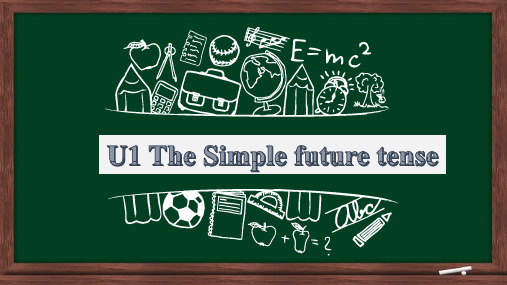
eg. My uncle is coming to see me tomorrow.
五、一般将来时特殊句式
1. There be 句式的一般将来时
Eg. There will be +其他 There is going to be+其他
2. 客观事实用一般现在
情态动词 (1)can/could:能够 could逾期 更委婉 (2)May/might 许可,准许 (3)Should 应该 主观义务
Have to 必须、不得不 (4)Must 主观必须,Must...?Yes,you must/no,you needn’t
Mustn’t 禁止 (5)Need 需要 Need...?Yes,you must/no,you needn’t
三、一般将来时 时间状语
Tomorrow、 Next week/month/year、 in+时间段、 this evening、 in the near future
四、一般将来时例句
1. 表示将来某个时间要发生的事 情或存在的状态。
eg.We will clean the room next week.
一、一般将来时用法(4)
1. 表示将来某个时间要发生的事 情或存在的状态。
3.条件、时间状语从句中,用一般 现在时表将来。
2. be going to 表示将要发生 或者打算、计划要做的事情,或者 可能发生的事情
4.go、come、leave、start等进行 时态表将来。
二、一般将来时结构 1. will / shall + 动词原形
Will / Shall +主语 + 动原 ?
英语语法 什么是一般将来时

英语语法什么是一般将来时一般将来时(Simple Future Tense)是英语语法中用来表示将来发生的动作、事件或状态的一种时态。
它在句子中起着重要的作用,可以帮助我们准确描述未来的计划、意图或预测。
在这篇文章中,我将详细探讨一般将来时的用法和构造,以及一些常见的例子。
请注意,这是一个详细的讨论,所以文章会比较长。
让我们开始吧!一、一般将来时的构造一般将来时的构造非常简单,主要由助动词"will"或"shall"加上动词的原形构成。
下面是一些例子:1. I will go to the party tomorrow.我明天会去参加派对。
2. She will study abroad next year.她明年会出国留学。
3. They will visit their grandparents this weekend.他们这个周末会去看望他们的祖父母。
4. We shall meet at the park.我们将在公园见面。
5. He will not come to the meeting.他不会来参加会议。
6. Will you help me with my homework?你会帮我做作业吗?二、表示计划和意图一般将来时常常用来表示将来的计划、意图或打算。
下面是一些例子:1. We will have a meeting tomorrow.我们明天会开会。
2. She will start a new job next month.她下个月会开始一份新工作。
3. They will travel to Europe next summer.他们明年夏天会去欧洲旅行。
4. I will buy a new car next year.我明年会买辆新车。
5. He will learn to play the piano.他会学弹钢琴。
6. We shall visit our friends in the evening.我们晚上会去拜访我们的朋友。
初二英语语法分析--一般将来时用法讲解
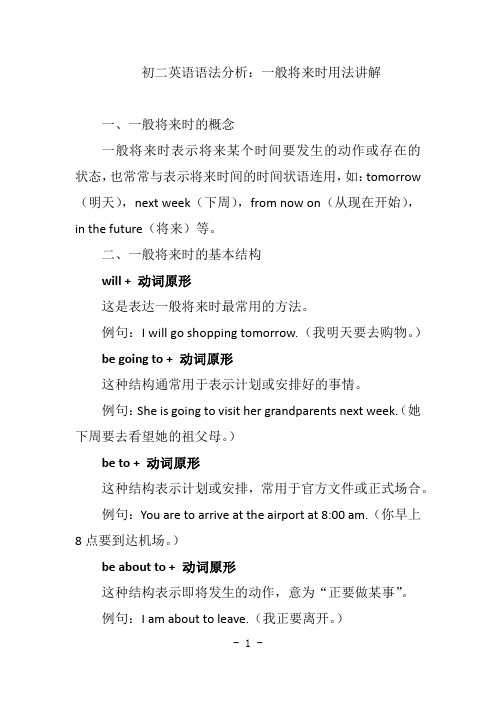
初二英语语法分析:一般将来时用法讲解一、一般将来时的概念一般将来时表示将来某个时间要发生的动作或存在的状态,也常常与表示将来时间的时间状语连用,如:tomorrow (明天),next week(下周),from now on(从现在开始),in the future(将来)等。
二、一般将来时的基本结构will + 动词原形这是表达一般将来时最常用的方法。
例句:I will go shopping tomorrow.(我明天要去购物。
)be going to + 动词原形这种结构通常用于表示计划或安排好的事情。
例句:She is going to visit her grandparents next week.(她下周要去看望她的祖父母。
)be to + 动词原形这种结构表示计划或安排,常用于官方文件或正式场合。
例句:You are to arrive at the airport at 8:00 am.(你早上8点要到达机场。
)be about to + 动词原形这种结构表示即将发生的动作,意为“正要做某事”。
例句:I am about to leave.(我正要离开。
)be due to + 动词原形这种结构表示某事预定或预期将要发生。
例句:The train is due to arrive at 5:00 pm.(火车预定下午5点到达。
)三、一般将来时的用法1表示将来的动作或状态例句:I will buy a new car next year.(明年我要买一辆新车。
)2表示将来的计划或安排例句:We are going to have a picnic this weekend.(我们这个周末要去野餐。
)3表示根据现有情况推测未来的可能性例句:It's going to rain soon.(很快就要下雨了。
)4表示命令、请求、建议等例句:You are to finish your homework before you go out.(你出去之前要把作业做完。
英语语法:一般将来时解释集

英语语法:一般将来时解释大全一、基本定义一般将来时是英语时态的一种,表示将来的动作或状态。
它主要用于描述未来的计划、预测或期望发生的事情。
二、形式构成一般将来时的构成主要有以下几种形式:1. 基本结构:主语+ will /shall + 动词原形+ 其他成分。
这是最基本的一般将来时形式,表示将来的动作或状态。
2. be going to 结构:主语+ be(am, is, are)going to + 动词原形+ 其他成分。
这种结构表示计划或安排将要发生的事情,也可以表示根据目前的迹象或情况预测将会发生的事情。
3. be+动词不定式:主语+ be(am, is, are)to + 动词原形+ 其他成分。
这种结构表示计划或安排将来要做的事情。
4. be+动词ing:主语+ be(am, is, are)+ 动词ing形式+ 其他成分。
这种结构表示即将发生的动作,通常与“when”连用。
5. be+表示时间的介词短语:主语+ be(am, is, are)+ 表示时间的介词短语。
这种结构用于表示将来某个时间点的情况。
6. 将来时间状语:tomorrow, next week, in the future等以上就是一般将来时的主要构成形式。
需要注意的是,在具体使用时,应根据语境和上下文选择合适的构成方式。
三、用法场景1. 表达未来的计划或意图,例如:I will go to the beach next summer.2. 描述未来的预测或期望,例如:It will rain this afternoon.3. 在条件句中表示将来的结果,例如:If you study hard, you will pass the exam.四、与其他时态的区别1. 与现在进行时态的区别:现在进行时态强调正在进行的动作,而一般将来时态强调将来的动作或状态。
2. 与过去时态的区别:过去时态表示过去的动作或状态,与将来时间无关。
小升初英语语法一般将来时

`一般将来时.一、基本知识点:1.含义:表示将要发生的动作或即将要做的事情,常与表示将来的时间状语连用。
2.标志(一般看到这些单词要用一般将来时):tomorrow、next week、next year等时间状语。
3.构成:(1)shall/will+动词原形:表示将来某个时间要发生的动作或存在的状态。
其中shall 通常用于第一人称,will可用于任何人称。
例:I(只能用于第一人称)shall clean my room tomorrow. / They will have a picnic next week.(2)Be going to+动词原形:表示即将发生或打算最近要做的事情,主要用于口语。
例:We are going to visit his grandmother next Monday.二、一般将来时的否定句、一般疑问句和特殊疑问句。
1、否定句:(1)shall/will+动词原形:直接在shall/will后+not。
shall→shall not=shan’t、will →will not=won’t。
例:you will be a good boy.→you won’t be a good boy.(2)Be going to+动词原形:直接在be+not。
例:Tom is going to eat vegetables tomorrow.→Tom isn’t going to eat vegetables tomorrow.2、一般疑问句:(1)①问句:把be动词提到句子最前或把情态动词提到句首,剩余语序不变。
(注意人称的变化,第一人称改为第二人称,第二人称改为第一人称,be动词随着人称的变化而变化)例:I will be happy.→will you be happy?/ I am going to swim.→Are you going to swim?②答句:yes,主语+be动词/ no,主语+be动词的否定形式。
一般将来时态知识点详解(初中英语专项复习) (4)
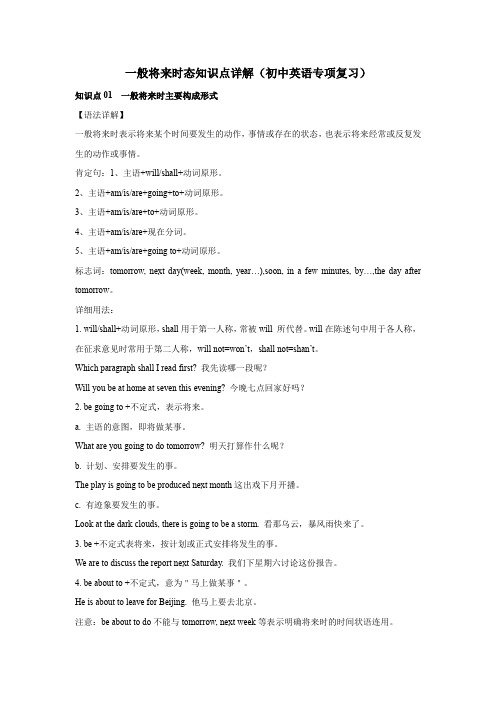
一般将来时态知识点详解(初中英语专项复习)知识点01 一般将来时主要构成形式【语法详解】一般将来时表示将来某个时间要发生的动作,事情或存在的状态,也表示将来经常或反复发生的动作或事情。
肯定句:1、主语+will/shall+动词原形。
2、主语+am/is/are+going+to+动词原形。
3、主语+am/is/are+to+动词原形。
4、主语+am/is/are+现在分词。
5、主语+am/is/are+going to+动词原形。
标志词:tomorrow, next day(week, month, year…),soon, in a few minutes, by…,the day after tomorrow。
详细用法:1. will/shall+动词原形,shall用于第一人称,常被will 所代替。
will在陈述句中用于各人称,在征求意见时常用于第二人称,will not=won’t,shall not=shan’t。
Which paragraph shall I read first? 我先读哪一段呢?Will you be at home at seven this evening? 今晚七点回家好吗?2. be going to +不定式,表示将来。
a. 主语的意图,即将做某事。
What are you going to do tomorrow? 明天打算作什么呢?b. 计划、安排要发生的事。
The play is going to be produced next month这出戏下月开播。
c. 有迹象要发生的事。
Look at the dark clouds, there is going to be a storm. 看那乌云,暴风雨快来了。
3. be +不定式表将来,按计划或正式安排将发生的事。
We are to discuss the report next Saturday. 我们下星期六讨论这份报告。
(完整版)初中英语语法一般将来时态

与一般将来时连用的时间状语
tomorrow 明天 the day after tomorrow 后天 soon 很快
this year 今年 next week 下周 in the future 将来
in three days 三天后
in ten minutes 在一般将来时 中用IN 表示在多久以后
What are they going to do this evening? They are going to watch TV.
What is the bear going to do tomorrow?
It is going to cook dinner.
What are they going to do ?
There will be only one country. 否定句:在will后面加not.
There won’t be only one country. 一般疑问句:把will提到there之前。
Will there be only one country? Yes, there will. / No, there won’t.
一般将来时的主要用法:
1、表示将来某一时刻的动作或状态: We will come to see you the day after tomorrow. There will be a wonderful show next week.
2、表示将来某一段时间内经常的动作或状态: The students will come and work in the lab once a
They will do heavy work.
They won`t do Will they do heavy work. heavy work?
语法讲解一般将来时

be doing结构表示将来时间
表示按计划安排即将发生的动作
The train is leaving at 5 o'clock.
表示根据时间表或日程安排即将发生的动作
The plane is taking off in 10 minutes.
表示按计划或约定即将发生的动作
We are meeting at the restaurant at 7 tonight.
go D. will, do, go
选择题练习
答案:D
解析:根据时间状语this weekend,第一空应使用将来时态;第二空是be doing表 示将来;第三空表示个人意愿,应使用一般现在时态。
翻译练习
我将在下个月去旅行。 答案:will go
I _____ _____ on a trip next month.
1 2
表示意愿或承诺做某事
I will help you with your project if you need me.
表示临时决定做某事
I will go to the store later, I don't have any milk left.
3
表示假设条件下的将来行动
If you don't mind, I will stay for dinner.
语法讲解一般将来时
目录
• 引言 • 一般将来时的定义和构成 • 一般将来时的基本用法 • 一般将来时的特殊用法 • 一般将来时的否定句和疑问句形式 • 练习和巩固
01
引言
主题简介
一般将来时是英语语法中的一种时态,用于描述将来发 生的事件或动作。
它通常由助动词will或shall后接动词原形构成,表示未 来的行为或状态。
初中英语语法汇总(一般将来时)

初中英语语法汇总(一般将来时)初中英语语法汇总〔一般将来时〕一、一般将来时的定义一般将来时表示在如今看来即将要发生的动作或存在的状态。
常用时间副词tomorrow, soon或短语next year / week / month, in a few days, in the future, sometime 做状语。
二、一般将来时的基本用法及构成〔1〕一般将来时的基本用法是表示单纯的将来事实,由"will / shall + 动词原形'构成:〔shall只用于第一人称〕例句:We shall have a lot of rain next month. 下个月将下许多雨。
I think she will pass the exam. 我想他考试会及格的。
〔2〕"be going to+动词原形'用来表示事先考虑过的将要发生的动作以及已有迹象说明必将要发生的某事,意为"准备;就要'。
如:1. Were going to meet outside the school gate. 我们准备在校门口见面。
2. Look! Its going to rain. 瞧!快下雨了。
(3) 用"be to+动词原形'表示。
主要表示按打算或支配即将要发生的动作;有时也表示指令、禁止或可能性:He is to leave for Beijing tomorrow. 他确定明天去北京。
Tell him hes not to be back late. 告知他不准迟回。
(4) 用"be about to+动词原形'表示。
主要表示即将要发生的事:He is about to leave. 他即将要离开。
Sit down, everyone. The film is about to start. 大家坐好,电影马上就要开发始了。
注:该结构通常不与具体的时间状语连用:误:He is about to leave soon [tomorrow].另外,该结构在美国英语中还可表示"准备'(主要用于否认句):Im not about to lend him any more money. 我不准备再借给他任何钱。
初中英语一般将来时语法讲解
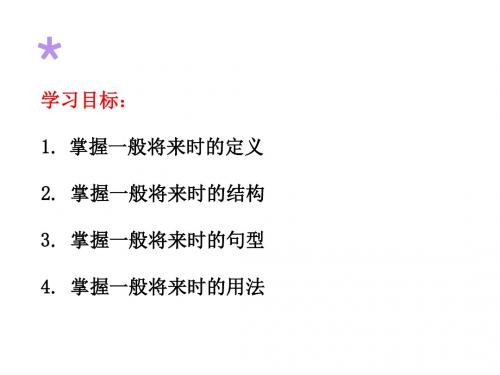
future
now
I will go back to my hometown next week. We will come to see you next Sunday.
2. 结构
(1)will +动词原形(主语是第一人称时也可用shall +动 词原形) (2)be(am, is, are) going to +动词原形
学习目标:
1. 掌握一般将来时的定义 2. 掌握一般将来时的结构
3. 掌握一般将来时的句型
4. 掌握一般将来时的用法
教学内容:
1. 一般将来时的定义 2. 一般将来时的结构
3. 一般将来时的句型
4. 一般将来时的用法
PART 01
定义和结构
1. 定义 表示将来某个时间要发生的动作或存在的状态,或 将来经常、反复发生的动作。
will/shall+动词原形 be going to +动词原形
表示较远的将来时间要发 生的事情 根据客观迹象表明马上要 发生的事情 没有“计划、准备”的意 思 表示近期就要发生的事情
表明说话者的主观意愿
含有“计划、准备”的意思
一、用词的适当形式填空。 1.He ____________(play )football after school . 2.It will be _____ (sun) tomorrow. 3.He __________ (be) a teacher in the future.
(4) “be +doing” 常与少量表示位置移动的动词,如go, come , start , move, leave等连用,用现在进行时表示 将来。 My aunt is leaving for Beijing next week.
小学生英语语法:一般将来时

四. 基本句型 1. 肯定句:主语 + be going to + v.原型+其它 I am going to visit Australia. She is going to buy some clothes.
They are going to play computer games.
2.否定句:在 be / will 后加not
7.Mother ____me a nice presrnt on my next birthday. A. is going to gives B. is going to give C. gives
B
B
8.
B a concert next Satyrday?
A.There is going to be
三. 与一般将来时连用的时间状语 this afternoon / evening, tonight 今 evening )明天… the day after tomorrow 后天 next week / Sunday / month / year下周/… soon 很快 不久 in three days 三天后 in the future 将来
I am not going to visit Australia. She isn’t going to buy some clothes.
3.一般疑问句句:将 be / will 动词提前。 (主语是第一人称I 时,变一般疑问句时 将I 变you) 1)I am going to visit Australia. ---Are you going to visit Australia? ---Yes, I am / No, I am not. 2)She is going to buy some clothes. --Is she going to buy some clothes? --Yes, she is. / No, she is not.
英语语法一般将来时讲解
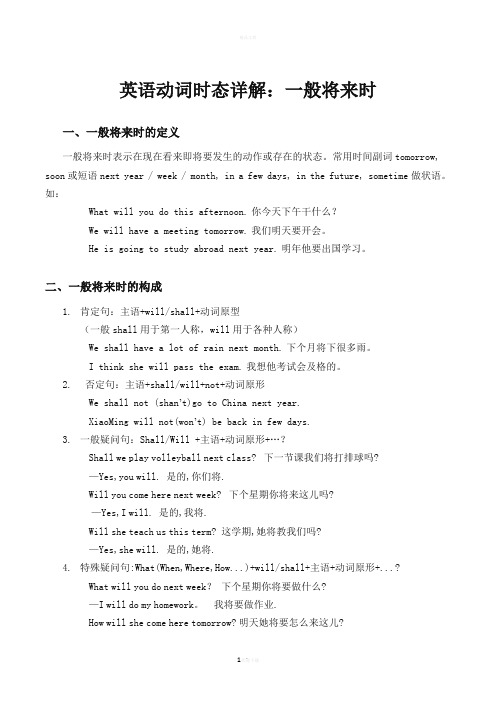
英语动词时态详解:一般将来时一、一般将来时的定义一般将来时表示在现在看来即将要发生的动作或存在的状态。
常用时间副词tomorrow, soon或短语next year / week / month, in a few days, in the future, sometime做状语。
如:What will you do this afternoon.你今天下午干什么?We will have a meeting tomorrow.我们明天要开会。
He is going to study abroad next year.明年他要出国学习。
二、一般将来时的构成1.肯定句:主语+will/shall+动词原型(一般shall用于第一人称,will用于各种人称)We shall have a lot of rain next month.下个月将下很多雨。
I think she will pass the exam.我想他考试会及格的。
2.否定句:主语+shall/will+not+动词原形We shall not (shan’t)go to China next year.XiaoMing will not(won’t) be back in few days.3.一般疑问句:Shall/Will +主语+动词原形+…?Shall we play volleyball next class?下一节课我们将打排球吗?—Yes,you will.是的,你们将.Will you come here next week?下个星期你将来这儿吗?—Yes,I will.是的,我将.Will she teach us this term?这学期,她将教我们吗?—Yes,she will.是的,她将.4.特殊疑问句:What(When,Where,How...)+will/shall+主语+动词原形+...?What will you do next week?下个星期你将要做什么?—I will do my homework。
小学英语语法之一般将来时

一般将来时一、一般将来时:表示将来某个时间要发生的动作、事情,或存在的状态。
二、.结构:▲(1)主语+will/shall+动词原形+(其他)shall用于主语是第一人称单数,will在陈述句中用于各人称.I shall do my homework tomorrow morning.I/He/She/They will do my/his/her/their homework tomorrow morning. He will get up soon.I will=I Shall=I’ll★在表示客观事实的时候只能用此结构。
(1).It will rain tomorrow.明天将要下雨.(2).It will be Teachers'Day the day after tomorrow.后天将是教师节.(3).My birthday will come.我生日将要到了.▲(2)主语+am/is/are going to+动词原形+(其他)a.主语的意图,即将做某事。
I am going to Shanghai tomorrow.b.计划,安排要发生的事。
The play is going to be produced next month。
c.有迹象要发生的事。
Look at the dark clouds,there is going to be a storm.(3)主语+be+to+动词原形+(其他),表示按计划要发生的事或征求对方意见。
We are to discuss the report next Saturday.(4)主语+am/is/are about to+动词原形,意为马上做某事。
He is about to leave for Beijing.(5)主语+be+v-ing,表示将来,表示按计划即将发生的动作,这类动词有go,come,start,move,sail,leave,arrive,stay,live,fly。
一般将来时
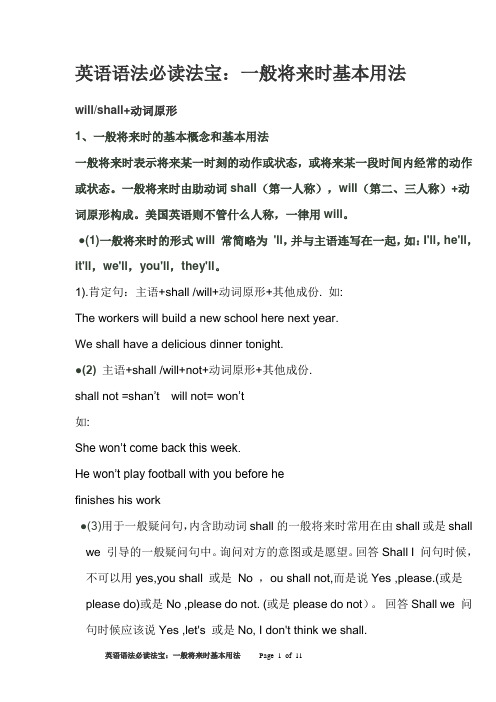
英语语法必读法宝:一般将来时基本用法will/shall+动词原形1、一般将来时的基本概念和基本用法一般将来时表示将来某一时刻的动作或状态,或将来某一段时间内经常的动作或状态。
一般将来时由助动词shall(第一人称),will(第二、三人称)+动词原形构成。
美国英语则不管什么人称,一律用will。
●(1)一般将来时的形式will 常简略为'll,并与主语连写在一起,如:I'll,he'll,it'll,we'll,you'll,they'll。
1).肯定句:主语+shall /will+动词原形+其他成份. 如:The workers will build a new school here next year.We shall have a delicious dinner tonight.●(2)主语+shall /will+not+动词原形+其他成份.shall not =shan’t will not= won’t如:She won’t come back this week.He won’t play football with you before hefinishes his work●(3)用于一般疑问句,内含助动词shall的一般将来时常用在由shall或是shall we 引导的一般疑问句中。
询问对方的意图或是愿望。
回答Shall I 问句时候,不可以用yes,you shall 或是No ,ou shall not,而是说Yes ,please.(或是please do)或是No ,please do not. (或是please do not)。
回答Shall we 问句时候应该说Yes ,let's 或是No, I don't think we shall.Shall /Will+主语+动词原形+其他成份?如:Will you please open the window?Shall we get something hot to drink?Shall I help you?Yes, please.No, please don't.Shall we call a taxi?Yes, let's.No, I don't think we shall.(4).特殊疑问句:特殊疑问词+shall /will+主语+动词原形+其他成份?Where will you go next week?What shall I do?(5) There be 句型的一般将来时为:There will be...=There is/are going to b e…(注意句型中going to 后面的be不能改为have。
- 1、下载文档前请自行甄别文档内容的完整性,平台不提供额外的编辑、内容补充、找答案等附加服务。
- 2、"仅部分预览"的文档,不可在线预览部分如存在完整性等问题,可反馈申请退款(可完整预览的文档不适用该条件!)。
- 3、如文档侵犯您的权益,请联系客服反馈,我们会尽快为您处理(人工客服工作时间:9:00-18:30)。
英语一般将来时的含义、结构、用法一、一般将来时的含义一般将来时表示将来某个时间要发生的动作或状态,或将来经常发生的动作或状态。
二、一般将来时的基本结构1. will/shall+动词原形will 在陈述句中用于各种人称;shall用于第一人称,常被will 所代替。
否定式:will not=won't;shall not=shan't一般疑问式:will/shall+主语+动词原形+其他?特殊疑问式:特殊疑问词+一般疑问式?I will/shall do a better job next time. 下次我要做得好些。
Oil and water will not mix. 油和水没法混在一起。
—Will he help you with your English tonight? 今天晚上他会帮助你学习英语吗?—Yes, he will./No, he won't. 是的,他会。
/不,他不会。
—When will you arrive for America? 你什么时候去美国?—Tomorrow. 明天。
2. am/is/are going to +动词原形否定式:am/is/are not going to +动词原形一般疑问式:am/is/are +主语+ going to + 动词原形+其他?特殊疑问式:特殊疑问词+一般疑问式?He is going to spend his holidays in London. 他打算在伦敦度假。
Look at the dark clouds. There is going to be a storm. 看那乌云,快要下雨了。
Is he going to collect any data for us? 他会帮我们收集数据吗?What are you going to do tomorrow? 明天你打算作什么?三、一般将来时的用法will+动词原形与am/is/are going to +动词原形的用法虽然都表示将来发生动作或情况,一般情况下能互换。
但它们的用法是有区别的。
1. will主要用于在以下三个方面:(1)表示主观意愿的将来。
They will go to visit the factory tomorrow.明天他们将去厂参观工厂。
I’ll come with Wang Bing, Liu Tao and Yang Ling.我将和王兵、刘涛、杨玲一起来。
(2)表示不以人的意志为转移的客观的将来。
Today is Saturday. Tomorrow will be Sunday.今天是星期六。
明天是(将)是星期日。
He will be thirty years old this time next year.明年这个时候他就(将)三十岁。
(3)表示临时决定,通常用于对话中。
—Mary has been ill for a week.玛丽病了一周了。
—Oh, I didn't know. I will go and see her.噢,我不知道。
我去看看她。
2. be going to主要用于一下两个方面:(1)表示事先经过考虑、安排好打算、计划要做某事。
Dad and I are going to watch an opera this afternoon.今天下午我和爸爸打算去看歌剧。
(2)表示根据目前某种迹象判断,某事非常有可能发生,表示推测。
Look! There come the dark clouds. It is going to rain. 瞧!乌云密集。
天要下雨了。
四、用其他时态表示将来含义的情况1. 用现在进行时表示将来。
瞬时动词和持续动词都可以用其现在进行时表达将来的含义,主要表示按规定或时间预计要发生的事。
(瞬时动词的进行时任何时候都表示将来的含义,持续动词的进行时只有在含有将来的时间状语或将来语境的条件下才表示将来)The bus is coming. 公交车就要来了。
The students are leaving on Sunday. 学生们星期日出发。
We’re having a party next week. 我们下星期将开一个晚会。
2. 用一般现在时表示将来。
(1)come, go, arrive, leave, start, begin, return等瞬时位移动词的一般现在时可以表示将来含义,主要用来表示在时间上已确定或安排好的事情。
The train leaves at six tomorrow morning. 火车明天上午六点开。
(2)在时间或条件状语从句中。
(主将从现)I'll write to you as soon as I arrive there. 我到了那里,就写信给你。
If it doesn't rain tomorrow, we will have a party in the park. 如果明天不下雨,我们就在公园举行一个聚会。
五、There be结构的一般将来时肯定式:There will be;There is/are going to be否定式:There won't be;There is/are not going to be一般疑问式:Will there be...;Is/are there going to be... 特殊疑问式:特殊疑问词+一般疑问式There will be a basketball match this afternoon.=There is going to be a basketball match this afternoon.今天下午会有一场篮球赛。
There won't be a basketball match this afternoon.=There isn't going to be a basketball match this afternoon. 今天下午没有篮球赛。
Will there be a basketball match this afternoon?=Is there going to be a basketball match this afternoon? 今天下午有篮球赛吗?When will there be a basketball match?=When is there going to be a basketball match?什么时候有一场篮球赛?一般将来时练习题:( ) 1. There __________ a meeting tomorrow afternoon.A. will be going toB. will going to beC. is going to beD. will go to be( ) 2. Charlie ________ here next month.A. isn't workB. doesn't workingC. isn't going to workingD. won't work( ) 3. He ______ very busy this week, he_____free next week.A. will be; isB. is; isC. will be; will beD. is; will be( ) 4. There_______ a dolphin show in the zoo tomorrow evening.A. wasB. is going to haveC. will haveD. is going to be( ) 5. —_____ you ______ free tomorrow?—No. I _____ free the day after tomorrow.A. Are; going to; willB. Are; going to be; willC. Are; going to; will beD. Are; going to be; will be( ) 6. Mother_____ me a nice present on my next birthday.A. will givesB. will giveC. givesD. give( ) 7. —Shall I buy a cup of tea for you?—________. (不,不要。
)A. No, you won't.B. No, you aren't.C. No, please don't.D. No, please.( ) 8. —Where is the morning paper?—I ________ if for you at once.A. getB. am gettingC. to getD. will get( ) 9. ________ a concert next Saturday?A. There will beB. Will there beC. There can beD. There are( ) 10. If they come, we ________ a meeting.A. haveB. will haveC. hadD. would have( ) 11. He ________ her a beautiful hat on her next birthday.A. givesB. gaveC. will givingD. is going to give( ) 12. He ________ to us as soon as he gets there.A. writesB. has writtenC. will writeD. wrote( ) 13. He ________ in three days.A. coming backB. came backC. will come backD. is going to coming back( ) 14. If it ________ tomorrow, we'll go roller-skating.A. isn't rainB. won't rainC. doesn't rainD. doesn't fine( ) 15. —Will his parents go to see the Terra Cotta Warriors tomorrow?—No, ________ (不去)A. they willn't.B. they won't.C. they aren't.D. they don't.KEYS:1. C2. D3. D4. D5. D6. B7. C8. D9. B 10. B 11. D 12. C 13. C 14. C 15. B。
